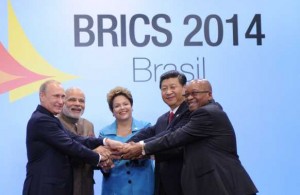 Terming the agreement towards setting up BRICS New Development Bank a significant step, Indian Prime Minister Narendra Modi Tuesday said an open international trading regime is critical for global economic growth.
Terming the agreement towards setting up BRICS New Development Bank a significant step, Indian Prime Minister Narendra Modi Tuesday said an open international trading regime is critical for global economic growth.
In his statement on the agenda “Sustainable Development and Inclusive Growth” at the sixth BRICS summit, he said the global economic environment remains uncertain and recovery was still fragile despite improved prospects.
Modi said that in an environment of political conflict and persisting weakness in major economies, countries have to be watchful for signs of a new bout of financial turmoil.
“Developments in Iraq and the wider region could affect this. I am also concerned that tight monetary policies in some countries could undercut investment and growth in ours,” he said, adding an open, rule-based, international trading regime is critical for global economic growth and must address the aspirations of the developing world.
“It must also accommodate the special needs of the most vulnerable sections of our societies, especially in areas such as food security. This is our broad expectation from the negotiations in the Doha Round of WTO,” he said.
“I am happy, the initiative announced at the BRICS Summit in New Delhi in 2012, has become a reality,” said Modi, who is taking part in his first international conference as prime minister, on the agreement for setting up the BRICS bank.
The agreement on the BRICS Contingent Reserve arrangement was another major achievement, he said, noting these initiatives “rooted in our own experience as developing countries” show “our capacity to set up global institutions”.
Referring to the summit’s theme, he said it was also the guiding principle of his government “given our vast social, regional and economic diversity”.
He said his government will invest heavily in infrastructure, affordable housing, healthcare, education and clean energy, while emphasising sustainability has been a core element of the Indian way of life.
Modi said that BRICS was in a position where it wields enough horizontal influence to compel the world to take notice but there was need to deepen the bonds vertically.
Calling for decentralisation, Modi said they must go “beyond summit and leader-centric deliberations and champion sub-national level exchanges”.
“We must encourage engagement between our states, cities and other local bodies,” he said, calling for BRICS to be driven by “people-to-people” contact and the youth should lead this.
“Popularizing our languages through dedicated BRICS language schools in all BRICS countries could be a beginning in this direction,” he said, even suggesting they explore the idea of a BRICS University as well as cooperation in areas like health, education, agriculture, resource management and urban development and a young scientists’ forum.
Other initiatives he suggested were an affordable BRICS healthcare platform, mechanism to further cooperation between small and medium enterprises and a common framework for promoting tourism.